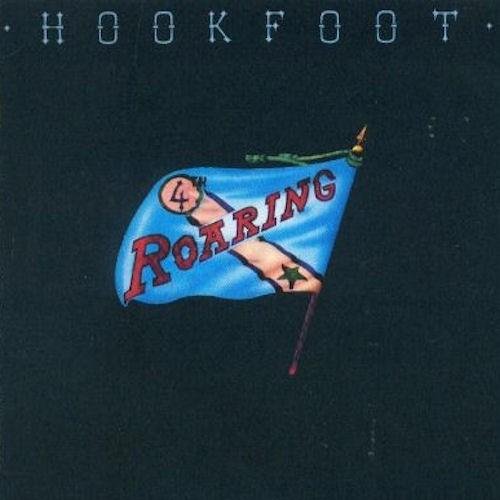Roaring - Hookfoot
$ 3.99 – $ 5.99
With six of the ten titles written or co-authored by lead vocalist Ian Duck, the fourth album by the session players who call themselves Hookfoot is a far more cohesive outing than their second, Good Times a' Comin', but suffers from the same affliction: These top-notch players say absolutely nothing.
Certainly not as dreadful as Nigel Benjamin trying to front Mott after Ian Hunter went solo, these dudes were, after all, still on good terms with the rock stars they performed with.
This is that other dilemma of backing musicians wanting more but not understanding the needs of the audience.
Caleb Quaye's "Tradin' Riffs" and Ian Duck's "Rockin' on the Good" might as well be the same song, as they flow seamlessly into one another, failing to bring any excitement to the table.
Roger Pope and Caleb Quaye come up with a somewhat better essay in "Maybe Tomorrow," but then the lead singer's vocal limitations and lack of star quality hold even a passable number back.
The lyrics are included on the LP jacket, as is an interesting and small live photo by Bob Gruen, but the cover painting of a flag with "4th" Roaring on a background of pea green is as boring as the music.
"Surely Lost Our Way" continues the tedium -- if lines like "dancing across my face/not to rip-off and deface/Or to turn into some human garbage place" aren't your cup of tea, there's no reason to go further.
Didn't performing on stage with a madman across the water rub off in any way, shape, or form? Heck, at least when Bernie Taupin produced the Hudson Brothers, they gave it their best shot and came out with pop music revered by fanatics.
The only thing a song like "In Many Ways (You're so Beautiful)" makes you want to do is to destroy your stereo.
OK, maybe this is as bad as Nigel Benjamin in Mott.
"Three Days Out" on side two is just a continuation of the last song on side one, Caleb Quaye's guitar lines showing no invention on either tune, just repeating like some boring day gig in a factory.
And when music starts to get that dry, what's the point? At least "Riding on a Thunderstorm" has a great groove (inspired by, the cover says, Ozark Airlines), but Ian Duck's voice is far from ducky; it is annoying and destroys this album's best chance for redemption.
There's no little nugget like Sutherland Brothers & Quiver would come up with, no "(I Don't Want to Love You But) You Got Me Anyway," just an endless groove.
And groove without content brings back the question asked regarding Good Times a' Comin': With all these famous friends and the Dick James catalog to peruse, how could these talented gents come up with recordings so limited in vision, so boring, so lifeless? Roaring is a record so bad that it is the listener who should get paid for having been put through the experience.
| Title/Composers | Performer | Listen | Time | Size | Size | |
|---|---|---|---|---|---|---|
| 1 | Tradin Riffs | Hookfoot | Play | 04:38 | 10 MB | 29 MB |
| 2 | Rockin On The Good | Hookfoot | Play | 05:09 | 11 MB | 29 MB |
| 3 | Maybe Tomorrow | Hookfoot | Play | 03:13 | 7 MB | 21 MB |
| 4 | Surely Lost Your Way | Hookfoot | Play | 02:45 | 6 MB | 18 MB |
| 5 | In Many Ways Youre So Beautiful | Hookfoot | Play | 04:34 | 10 MB | 30 MB |
| 6 | Three Days Out | Hookfoot | Play | 04:47 | 10 MB | 31 MB |
| 7 | Ridin On A Thunderstorm | Hookfoot | Play | 06:00 | 13 MB | 36 MB |
| 8 | Theres A Chance | Hookfoot | Play | 00:57 | 2 MB | 4 MB |
| 9 | Theres A Chance (Mix) | Hookfoot | Play | 03:42 | 8 MB | 23 MB |
| 10 | Roll Of Drums | Hookfoot | Play | 05:35 | 12 MB | 31 MB |
| 41 mins | 94 MB | |||||
| 41 mins | 255 MB | |||||
| Artist | Job | |
|---|---|---|
| 1 | Ian Duck | Harmonica, Vocals |
| 2 | Phil Dunne | Engineer |
| 3 | Fred Gandy | Bass, Vocals |
| 4 | Hookfoot | Primary Artist |
| 5 | Roger Pope | Drums, Vocals |
| 6 | Caleb Quaye | Guitar, Keyboards, Producer, Vocals |
Hookfoot
| Quality | Format | Encoding | Description |
|---|---|---|---|
| Standard | MP3 | 320kps 44.1kHz | MP3 is an audio coding format which uses a form of lossy data compression. The highest bitrate of this format is 320kbps (kbit/s). MP3 Digital audio takes less amount of space (up to 90% reduction in size) and the quality is not as good as the original one. |
| CD Quality | FLAC | 16bit 44.1kHz | FLAC is an audio coding format which uses lossless compression. Digital audio in FLAC format has a smaller size and retains the same quality of the original Compact Disc (CD). |






